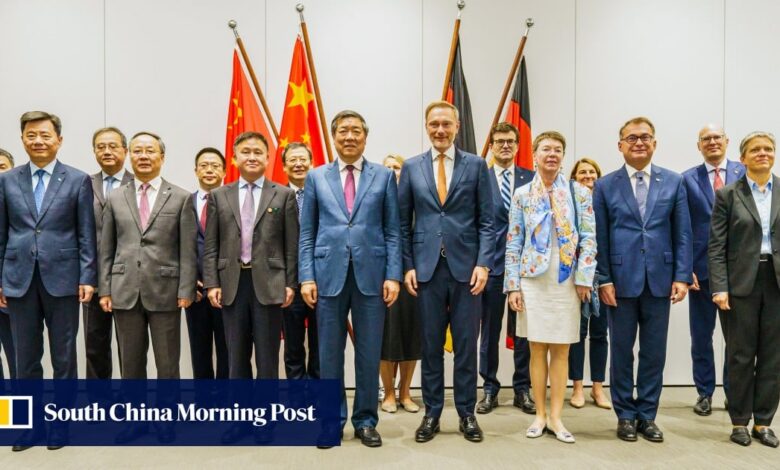Refreshed China-Germany deal helps Beijing keep economic foothold in West amid US-led decoupling

[ad_1]
“The fact that they signed, itself, has intrinsic value,” said Jayant Menon, a senior fellow at the ISEAS-Yusof Ishak Institute in Singapore. “It’s about building trust, and very often these agreements suggest improvements in diplomatic relations.”
On Saturday, Baerbock said in a speech that her country’s China strategy was about “de-risking and not decoupling”. She called it a “call to action – to get engaged” with businesses and other European countries.
China’s updated agreement with Europe’s largest economy keeps the door open to part of the world where other leaders have tried to pare Beijing’s influence in industrial supply chains.
“The move toward de-risking, rather than decoupling, indicates that there is some appetite for risk in collaborating with [China],” said Chong Jia Ian, an associate professor of political science at the National University of Singapore.
German Chancellor Olaf Scholz recently warned against trade protectionism, amid the European Union’s probe into China’s subsidies for electric vehicles. The joint statement commits both countries to fight “trade protectionism”.
Chong said Germany and its partners are likely to increase communication in high-end semiconductors, but they may remain cautious about importing Chinese telecoms equipment.
Huawei facing pressure in Europe after report Germany is mulling 5G ban
Huawei facing pressure in Europe after report Germany is mulling 5G ban
“Germany’s China Strategy document is one of its kind, as [Berlin] has not done one on any other country of the world,” said Zha Daojiong, a professor of international political economy at Peking University.
During the weekend dialogue in Frankfurt, visiting Vice-Premier He Lifeng said via Xinhua that China wants to “deepen mutually beneficial cooperation with Germany and inject more positive energy into the bilateral comprehensive strategic partnership”.
Other European heavyweights, along with the US, have tempered economic engagement with China since 2019 because of Chinese data laws, trade barriers and fears that Beijing is using foreign technology for military purposes. Older disputes over human rights and geopolitics such as China’s support for Russia remain in view, too.
Those leaders will be keeping a close eye on China’s deal with Germany, according to analysts.
“I’m pretty sure the [US] State Department people and national security staff must be paying attention to this,” said Chen Zhiwu, chair professor of finance at the University of Hong Kong.
Germany has been China’s top trading partner in the European region for seven consecutive years and was its top source of foreign investment in Europe last year. Bilateral trade reached a record €298 billion (US$312 billion) last year, according to official German figures.
Last year, Germany invested a record €11.5 billion in China, according to the German monetary authority, Deutsche Bundesbank. The biggest investors were Volkswagen, Mercedes-Benz and BMW Group.
Yet, concerns about geopolitical risks have spilled over into German direct investments in China, which dropped to €10.31 billion in the first half of 2023 from €12 billion in the same period last year, according to a Reuters report citing the German economic research institute IW.
“It will be interesting to watch how Beijing, in particular, implements this agreement, given the meaningful changes to European debate on China we have seen since 2019, and given Beijing sees Berlin as a special partner in Europe,” said Lily McElwee, a China scholar with the Centre for Strategic and International Studies, a US-based think tank.
[ad_2]
Source link






